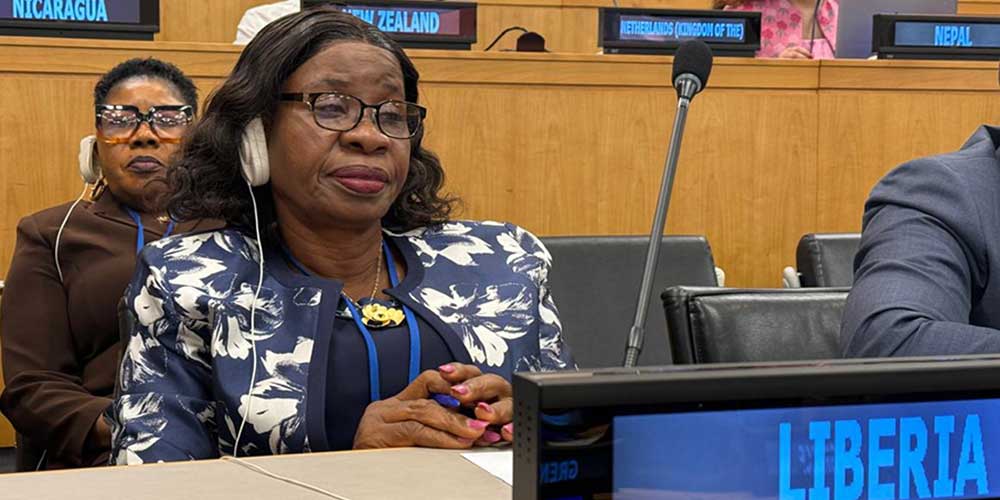Mr. Chair, Let me begin by congratulating you on your well-deserved election as Chair of the Second Committee. Your election is a clear reflection of the confidence that Member States have placed in your leadership and commitment to advancing the global development agenda.
Mr. Chair, Liberia aligns itself with the statement delivered by the distinguished representative of the African Group and welcomes the Committee’s vital focus on advancing the 2030 Agenda for Sustainable Development at this critical juncture.
Liberia’s firm conviction remains that no nation can achieve sustainable development in isolation. Our national journey—from post-conflict recovery to democratic consolidation and now to our recent election to serve as a non-permanent member of the United Nations Security Council for the 2026–2027 term—has taught us that global solidarity and multilateral cooperation are not options, but imperatives.
As we enter the final five years of the 2030 Agenda, we face a stark reality: progress has been uneven, and in many areas, has either stalled or regressed. The compounded effects of the COVID-19 pandemic, global economic uncertainty, food and energy insecurity, and the escalating impacts of climate change have widened development gaps, especially for countries in special situations. In this context, the urgency to accelerate implementation of the SDGs cannot be overstated.
Liberia supports the “Pact for the Future”, currently under negotiation, and welcomes its ambition to strengthen international cooperation for sustainable development. We believe the Pact must deliver concrete outcomes on financing, technology transfer, digital inclusion, and the reform of the global financial architecture to ensure equity and resilience in the face of future shocks.
In this regard, we also commend the convening of the Financing for Development Conference in Seville, which offered a crucial platform for mobilizing the political will and innovative solutions needed to close the development financing gap. Liberia emphasizes that financing sustainable development requires not just increased resources, but reimagined systems. Official development assistance (ODA) must be predictable and aligned with national priorities. Equally important is the need to unlock private capital, promote blended finance, and ensure that development finance is accessible and equitable—particularly for least developed and climate-vulnerable countries.
Mr. Chair,
Liberia continues to advocate for debt relief and restructuring for vulnerable economies. Unsustainable debt burdens constrain fiscal space, limit social investment, and undermine our capacity to achieve the SDGs. Debt should be a tool for development, not a trap. We echo the call for fairer mechanisms to assess and manage sovereign debt, including debt-for-climate and debt-for-nature swaps.
On the issue of climate change, Liberia reaffirms its strong commitments under the Paris Agreement and our Nationally Determined Contributions (NDCs). As a forest-rich country, Liberia plays a critical role in global climate mitigation. We are implementing policies that protect our forests, promote renewable energy, and build resilience in coastal communities. But we cannot do this alone. The principle of common but differentiated responsibilities must be upheld, and climate finance must be delivered at scale and with urgency.
Mr. Chair,
Liberia also recognizes that the pathway to sustainability must be paved with economic diversification, digital transformation, and regional integration. We are leveraging the African Continental Free Trade Area (AfCFTA) to expand trade and industrial capacity. We are also investing in digital infrastructure to improve public services and unlock the creativity and innovation of our young population. However, realizing the full potential of these efforts requires greater international support in the areas of infrastructure, education, and affordable access to technology.
Mr. Chair,
We must also underscore the importance of peace, governance, and inclusion as enablers of sustainable development. Liberia’s own experience proves that progress is only possible where peace, human rights, and the rule of law are safeguarded.
In conclusion, Mr. Chair, Liberia’s development journey is one of resilience, partnership, and hope. We remain firmly committed to the 2030 Agenda, and we call on all Member States, development partners, international financial institutions, and the private sector to join hands in a renewed global compact for development.
Let us use the remaining years before 2030 not only to deliver on promises, but to reaffirm our shared humanity and collective responsibility.
Liberia stands ready to work with all partners to translate ambition into action, and to build a future that is sustainable, peaceful, and inclusive—for all.
Thank you.

